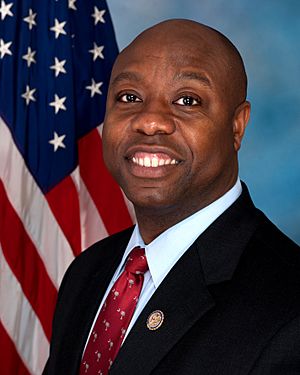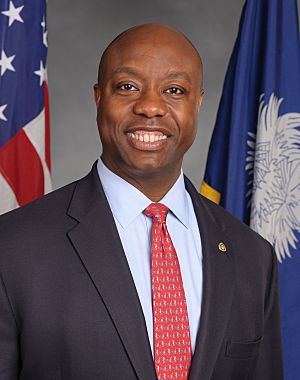Tim Scott facts for kids
Quick facts for kids
Tim Scott
|
|||||||||||||||||||||||||||||||||||||||
|---|---|---|---|---|---|---|---|---|---|---|---|---|---|---|---|---|---|---|---|---|---|---|---|---|---|---|---|---|---|---|---|---|---|---|---|---|---|---|---|
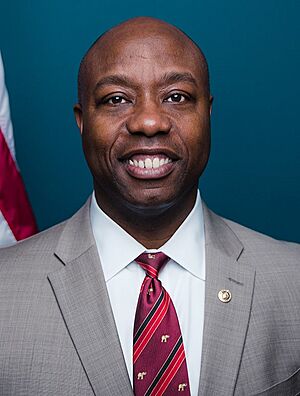
Official portrait, 2018
|
|||||||||||||||||||||||||||||||||||||||
| United States Senator from South Carolina |
|||||||||||||||||||||||||||||||||||||||
| Assumed office January 2, 2013 Serving with Lindsey Graham
|
|||||||||||||||||||||||||||||||||||||||
| Preceded by | Jim DeMint | ||||||||||||||||||||||||||||||||||||||
|
|||||||||||||||||||||||||||||||||||||||
| Member of the U.S. House of Representatives from South Carolina's 1st district |
|||||||||||||||||||||||||||||||||||||||
| In office January 3, 2011 – January 2, 2013 |
|||||||||||||||||||||||||||||||||||||||
| Preceded by | Henry E. Brown Jr. | ||||||||||||||||||||||||||||||||||||||
| Succeeded by | Mark Sanford | ||||||||||||||||||||||||||||||||||||||
| Member of the South Carolina House of Representatives from the 117th district |
|||||||||||||||||||||||||||||||||||||||
| In office January 3, 2009 – January 3, 2011 |
|||||||||||||||||||||||||||||||||||||||
| Preceded by | Tom Dantzler | ||||||||||||||||||||||||||||||||||||||
| Succeeded by | Bill Crosby | ||||||||||||||||||||||||||||||||||||||
| Member of the Charleston County Council from the 3rd district |
|||||||||||||||||||||||||||||||||||||||
| In office February 8, 1995 – January 3, 2009 |
|||||||||||||||||||||||||||||||||||||||
| Preceded by | Keith Summey | ||||||||||||||||||||||||||||||||||||||
| Succeeded by | Elliott Summey | ||||||||||||||||||||||||||||||||||||||
| Personal details | |||||||||||||||||||||||||||||||||||||||
| Born |
Timothy Eugene Scott
September 19, 1965 North Charleston, South Carolina, U.S. |
||||||||||||||||||||||||||||||||||||||
| Political party | Republican | ||||||||||||||||||||||||||||||||||||||
| Spouse |
Mindy Noce
(m. 2024) |
||||||||||||||||||||||||||||||||||||||
| Education | Presbyterian College Charleston Southern University (BS) |
||||||||||||||||||||||||||||||||||||||
| Signature |  |
||||||||||||||||||||||||||||||||||||||
| Website | |||||||||||||||||||||||||||||||||||||||
Timothy Eugene Scott (born September 19, 1965) is an American politician and businessman. Since 2013, he has served as a U.S. Senator for South Carolina. He is a member of the Republican Party.
Scott has made history in several ways. He is the first African-American senator in the Southern United States to be directly elected by voters. He is also the longest-serving Black senator in U.S. history. He is the first Black American to serve in both the U.S. House of Representatives and the U.S. Senate. Plus, he is the first Black senator to lead a full committee.
Born and raised in Charleston, Scott worked in financial services before starting his political career. He served on the Charleston County Council from 1995 to 2009. He was also a member of the South Carolina General Assembly from 2009 to 2011. From 2011 to 2013, he represented South Carolina's 1st district in the U.S. House of Representatives.
In 2013, Governor Nikki Haley chose Scott to become a U.S. Senator after Jim DeMint resigned. Scott won a special election for the seat in 2014. He was then elected to a full term in 2016 and again in 2022. In May 2023, Scott announced he would run for president in 2024. However, he ended his campaign in November 2023. After the 2024 elections, Scott was chosen to lead the National Republican Senatorial Committee. He also leads the Senate Committee on Banking.
Contents
Early Life and Education
Tim Scott was born on September 19, 1965, in North Charleston, South Carolina. His mother, Frances, worked as a nursing assistant. His parents divorced when he was seven years old. He and his older brother grew up in a working-class family with their mother. She often worked extra shifts to support them.
After his parents divorced, Scott, his mother, and brother moved in with his grandparents. He became very close with his grandfather.
As a freshman at R.B. Stall High School, Scott struggled in several classes. His mother sent him to summer school, and he paid for it by working at a local movie theater. There, he met John Moniz, who owned a nearby Chick-fil-A. Moniz became an important mentor to Scott. He taught Scott about responsibility, business, and money.
Scott enjoyed sports and was good at football. He faced challenges in high school but was elected student body vice president in his junior year. He became student body president as a senior.
Before his senior year, Scott had a car accident that affected his football scholarship chances. He attended Presbyterian College from 1983 to 1984 on a partial football scholarship. There, he joined the Fellowship of Christian Athletes, which deepened his Christian faith. Scott later transferred to Charleston Southern University. He graduated in 1988 with a degree in political science.
After college, Scott worked as an insurance agent and financial adviser. He later started his own insurance agency, Tim Scott Allstate.
Early Political Career
Serving on Charleston County Council (1995–2009)
Scott first ran for the Charleston County Council in a special election in February 1995. He won the seat as a Republican, getting almost 80% of the votes. He became the first Black Republican elected to any office in South Carolina since the late 1800s.
Scott was reelected to the Charleston County Council in 2000 and again in 2004. He served on the council until 2009 and became its chairman in 2007.
In 1997, Scott supported putting the Ten Commandments outside the council chambers. He said it would remind members of important rules. The council approved it, and Scott put a King James version of the Commandments on the wall. This led to a lawsuit from groups like the ACLU. The court initially ruled the display was against the law. The council settled the case to avoid more legal costs. Scott believed the effort was worth the cost.
In 2001, the U.S. Department of Justice sued Charleston County. They said the way council members were elected (at-large, meaning the whole county voted for each seat) was unfair to African-American voters. The Justice Department said this method made it hard for Black voters to elect candidates they preferred. Scott, the only African American on the council, said he didn't like the idea of dividing everyone into smaller districts. He believed voters could choose anyone, regardless of race.
The Department of Justice won the case. A new plan was put in place where council members were elected from smaller, specific districts. Scott was then elected to the Charleston County Council from District 3.
South Carolina House of Representatives (2009–2011)
In 2008, Tim Scott ran for a seat in the South Carolina House of Representatives. He won the Republican primary and then the general election without opposition. He became the first Black Republican State Representative in South Carolina in over 100 years.
While in the state legislature, Scott supported South Carolina's right-to-work laws. These laws make it easier for companies to operate without strong union rules. He believed this helped companies like Boeing choose South Carolina for manufacturing.
Scott was known for his stands against higher taxes. He earned a good score from the South Carolina Club for Growth, a group that supports lower taxes.
U.S. House of Representatives (2011–2013)
Running for Congress
In 2010, Scott decided to run for the U.S. House of Representatives. He ran for South Carolina's 1st congressional district. This district includes Charleston and much of the state's coastline.
Scott won the Republican primary election. He then won the general election against his Democratic opponent. With this victory, Scott became one of the first African-American Republicans in Congress since 2003. He was also the first African-American Republican elected to Congress from South Carolina in 114 years.
In 2012, Scott ran for reelection and won again.
Serving as a Congressman
Scott chose not to join the Congressional Black Caucus (CBC). He respected the CBC's work but said his campaign was not focused on race.
Scott supported a bill that would prevent the National Labor Relations Board from forcing companies to move or close. This was after the NLRB had opposed Boeing moving a production facility to South Carolina.
He also worked to get federal money for a project to deepen Charleston harbor. He said this project was important for the nation because it would allow larger cargo ships to use the port and create jobs.
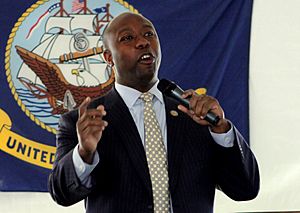
Scott served on the Committee on Transportation and the Committee on Small Business. Later, he was appointed to the Committee on Rules.
U.S. Senate (2013–Present)
Appointment to the Senate
On December 17, 2012, South Carolina Governor Nikki Haley announced she would appoint Tim Scott to the U.S. Senate. He replaced Senator Jim DeMint, who had resigned. Scott became the first African American U.S. Senator from South Carolina. He was also the first African American to be a U.S. Senator from the Southern United States since the Reconstruction period after the Civil War.
Governor Haley said she chose Scott because he had earned the seat through his character and achievements.
Senate Elections
Scott ran to serve the rest of DeMint's term in 2014 and won. He was reelected to a full term in 2016.
In July 2018, Scott, along with Senators Cory Booker and Kamala Harris, worked together on a bill. This bill aimed to make lynching a federal hate crime.
In April 2021, Scott gave the Republican response to President Joe Biden's speech to Congress.
In August 2019, Scott said he planned to run for reelection in 2022, but that it would be his last time. He was reelected in 2022, defeating Democratic candidate Krystle Matthews.
Work in the U.S. Senate
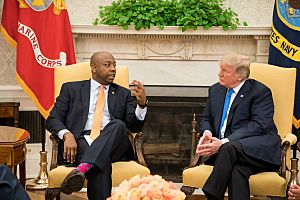
Justice Act
Scott led the effort to create a bill about race and police reform, called the Justice Act. He faced some criticism but pointed out that he had experienced racial profiling himself and had been speaking out on these issues for years.
The Justice Act included several important points:
- It asked for more federal reports on how police use force and no-knock warrants.
- It increased punishments for false police reports.
- It would stop funding for police departments that allow chokeholds when deadly force is not needed.
- It offered money for police to use body cameras and set penalties for not using them.
- It aimed to create a database of police disciplinary records to help with hiring.
- It made lynching a federal crime.
- It directed the Justice Department to provide training on de-escalation tactics.
The bill did not include some things Democrats wanted, like changes to qualified immunity. The bill did not pass, getting 55 votes out of the 60 needed.
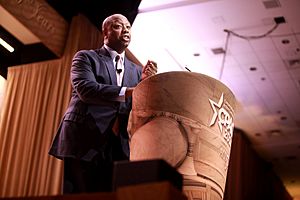
Committee Assignments
Scott is currently the Chairman of the Committee on Banking, Housing, and Urban Affairs. He also serves on other important committees:
- Committee on Finance
- Committee on Health, Education, Labor, and Pensions
- Committee on Small Business and Entrepreneurship
- Commission on Security and Cooperation in Europe
2024 Presidential Campaign
In February 2023, reports said that Scott was getting ready to run for president. He announced a "listening tour" to meet voters. He officially announced his candidacy for president on May 22, 2023.
However, Scott announced he was ending his campaign on November 12, 2023, due to low support in polls.
Political Views
Taxes and Spending
Scott believes that the government should spend less money and that taxes should be lower.
Health Care
Scott thinks the Affordable Care Act should be removed. He believes the U.S. has excellent health care. He supports other health care ideas that he says would keep benefits while controlling costs.
Economic Development
Scott supports building new infrastructure and public works projects in his district. He is against limits on deepwater oil drilling.
Social Issues
Scott is against same-sex marriage. He voted against the Respect for Marriage Act in 2022, which recognized same-sex marriage federally.
In 2022 and 2023, he supported a bill called the PROTECT Kids Act. This bill would cut federal money to schools if they didn't tell parents about changes in children's "pronouns, gender markers, or sex-based accommodations (like locker rooms and bathrooms)." In a debate in August 2023, he said, "If God made you a man, you play sports—against men."
Immigration
Scott supports strong laws against illegal immigration. He wants to make English the official language for the government and require new immigrants to learn English. He is against a path to citizenship for undocumented immigrants.
Foreign Policy
Scott believed the U.S. should continue its military presence in Afghanistan. He sees Iran as a dangerous country and thinks the U.S. should help groups there that want democracy. Scott was against the 2011 military action in Libya.
Scott has rejected calls for a ceasefire in the Gaza war. He believes that the U.S. should not negotiate with groups he considers evil, but rather defeat them. He has also opposed sending humanitarian aid to Palestinian civilians in the Gaza Strip. In a November 2023 debate, Scott suggested that the U.S. should target Iran directly, calling it "the head of the snake."
China
In 2017, Scott supported a bill to make it harder for foreign companies, especially from China, to buy U.S. tech companies. This bill aimed to protect national security and American information.
Trade
In 2018, Scott was one of many senators who asked President Donald Trump to keep the North American Free Trade Agreement (NAFTA) in a modern form.
Environment
In 2017, Scott was one of 22 senators who asked President Donald Trump to remove the United States from the Paris Agreement. This agreement aims to fight climate change.
Judicial Nominations
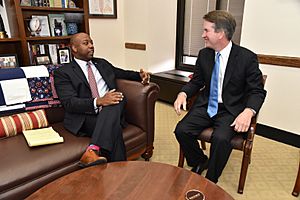
Scott did not support the nomination of Ryan Bounds to a federal court. He said his decision was based on Bounds's "bigoted statements" from when he was a student. This effectively stopped the nomination.
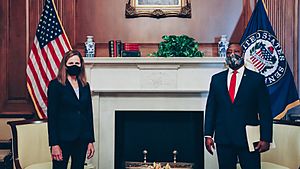
In 2018, Scott went against his party by opposing the nomination of Thomas A. Farr for a federal judgeship. Farr had been accused of trying to stop African-American voters in past elections. Scott said the Republican Party needed to do a better job of avoiding issues related to race in America.
Personal Life
Tim Scott married Mindy Noce on August 3, 2024, in Mount Pleasant, South Carolina. Before entering politics, Scott worked in insurance and real estate. He owned Tim Scott Allstate and was a partner in Pathway Real Estate Group, LLC. He is a member of Seacoast Church, a large church in Charleston.
See also
 In Spanish: Tim Scott para niños
In Spanish: Tim Scott para niños
- Black conservatism in the United States
- Timeline of African-American firsts
- List of African-American Republicans
- List of African-American United States representatives
- List of African-American United States senators
 | Bayard Rustin |
 | Jeannette Carter |
 | Jeremiah A. Brown |


